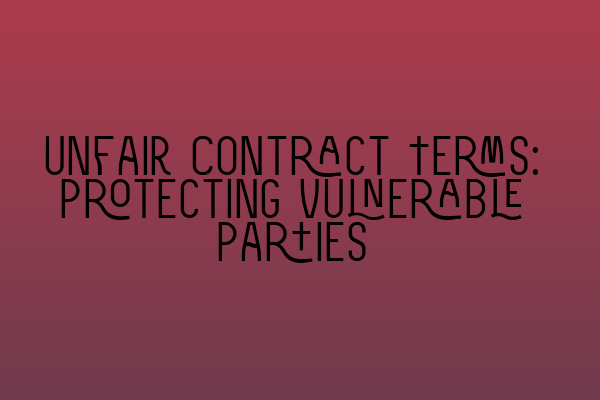Unfair Contract Terms: Protecting Vulnerable Parties
Introduction
Contracts are the foundation of business transactions. They provide clarity, establish rights and obligations, and help parties maintain mutually beneficial relationships. However, the power dynamics between parties involved in a contract can sometimes be uneven, leading to the potential exploitation of vulnerable parties.
In this article, we will explore the concept of unfair contract terms and its significance in protecting vulnerable parties. We will discuss the legal framework surrounding unfair terms and highlight the importance of ensuring fairness and equity in contractual agreements.
The Definition of Unfair Contract Terms
An unfair contract term refers to a provision in a contract that places one party at a disadvantage or restricts their rights, in a way that is contrary to good faith and fair dealing. Such terms may grant excessive powers to one party or impose unreasonable obligations on the other.
Unfair contract terms can be found in various types of agreements, including consumer contracts, employment contracts, and business contracts. However, the focus of our discussion will primarily be on unfair terms in consumer contracts, as these agreements often involve a significant power imbalance between the consumer and the business.
Legal Framework for Unfair Contract Terms
In the United Kingdom, unfair contract terms are regulated by the Consumer Rights Act 2015. This legislation provides protections for consumers against unfair terms in contracts entered into in the course of business.
The Act identifies three key types of unfair terms:
- Terms that exclude or limit liability for negligence;
- Terms that enable the business to vary the contract unilaterally;
- Terms that create an imbalance in the parties’ rights and obligations.
These provisions aim to ensure that consumers are not subjected to unfair terms that exploit their vulnerability or infringe upon their rights.
Protecting Vulnerable Parties
Vulnerable parties, such as consumers, employees, and small businesses, often face significant challenges when negotiating contracts. They may lack the necessary knowledge, resources, or bargaining power to protect their interests effectively. Unfair contract terms can exacerbate this vulnerability and result in unfair, exploitative situations.
To protect vulnerable parties, it is essential to:
- Ensure transparency and clarity: Contracts should be written in plain and straightforward language, enabling all parties to understand their rights and obligations without ambiguity.
- Prohibit unfair terms: Legislation, such as the Consumer Rights Act, restricts the use of unfair terms and provides mechanisms for challenging their validity.
- Educate and empower: Educating consumers and other vulnerable parties about their legal rights and how to identify unfair contract terms can empower them to make informed decisions and enter into fair agreements.
- Seek legal advice: Engaging the services of a solicitor who specializes in contract law can help vulnerable parties navigate complex agreements and ensure they are entering into fair contracts.
By implementing these measures, we can create a more equitable environment for all parties involved in contractual relationships.
Conclusion
Unfair contract terms have the potential to exploit vulnerable parties and undermine the trust that should underpin every contractual relationship. The legal framework, coupled with the proactive efforts of all stakeholders, plays a crucial role in protecting vulnerable parties.
As solicitors at SQE Contract Law, we are committed to ensuring fairness and upholding the rights of all parties in contractual agreements. If you need assistance or advice regarding unfair contract terms, please contact us. You can also explore our related articles for further insights:
- Exploring the Impact of Frustration on Contractual Obligations: Legal Insights
- Interpreting Contractual Clauses: Unlocking the Hidden Meanings
- Legal Aspects of Business Contracts: Key Considerations for Entrepreneurs
- Agreements in Contract Law: Understanding Its Various Types
- Essentials of Consideration: Understanding the Basis of Contractual Exchange
Together, we can strive towards a fair and just contract law landscape.
